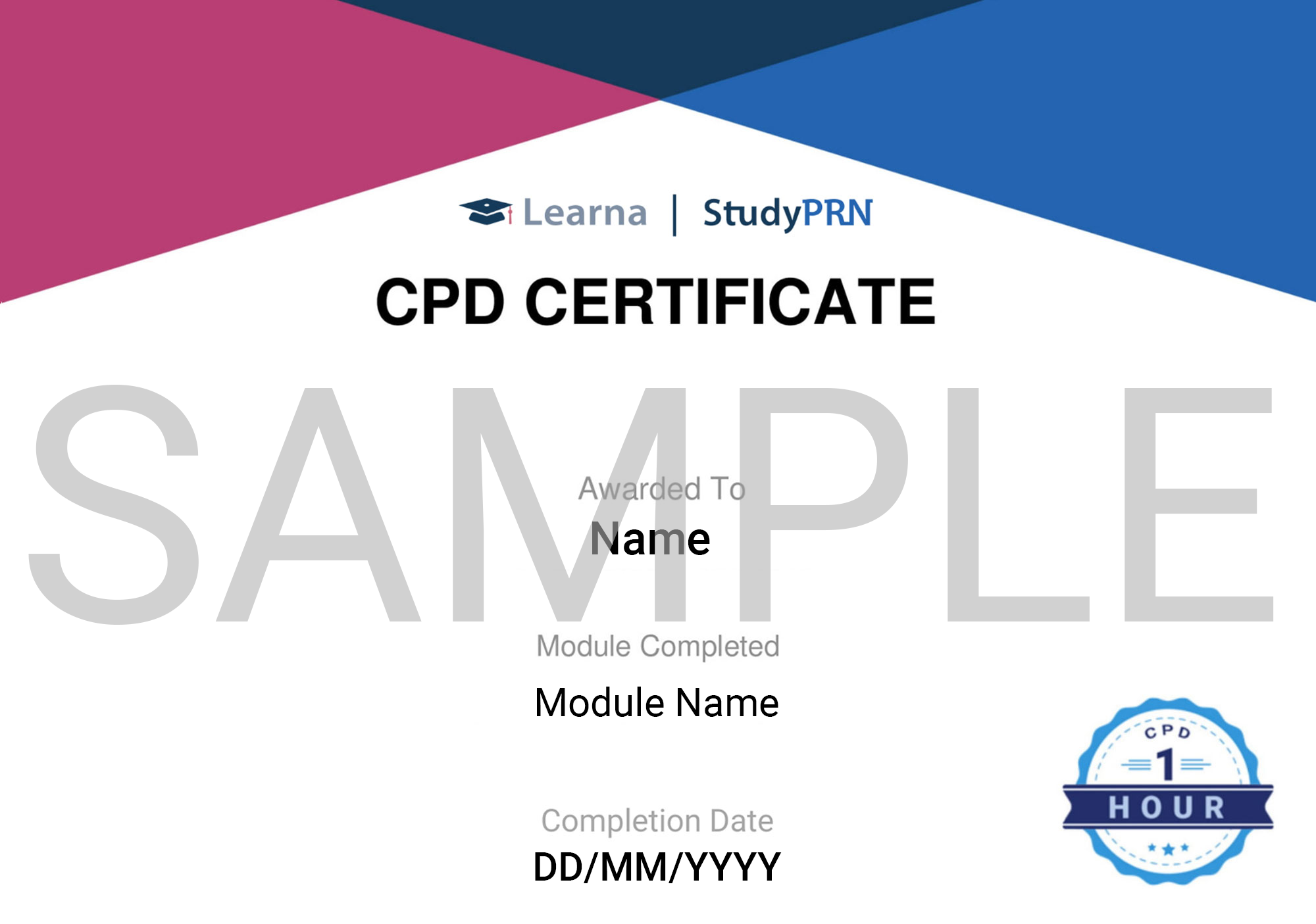Myalgic Encephalomyelitis / Chronic Fatigue Syndrome
 4.4 Star Rating
4.4 Star Rating
Awarded with
1 CPD HOURS

ME/CFS CPD | Module Overview
10 Questions
This online ME/CFS CPD module will challenge your clinical knowledge and patient management as a Healthcare Professional.
Expert Authors
This CPD module has been written by medical experts in their field, ensuring you receive the highest quality questions available.
Instant Feedback
Receive further reading and a full explanation of answers to ensure your knowledge and understanding are in line with current guidelines.
Compare Responses
View peer responses, reflect using our online notes system and benefit from unlimited resits to keep your clinical knowledge up-to-date.
24/7 Access
Learn around your busy schedule by accessing this module whenever and wherever you’d like — all you need is an internet connection!
CPD Certificate
On successful completion of this module, you’ll be awarded with a downloadable 1 hour CPD Certificate to include in your portfolio.
Dr Nina Muirhead | Resource Author
"ME/CFS is one of the most fascinating and important diseases of our time. This module was first developed as a patient-professional collaboration in 2020 when the Coronavirus pandemic began and there was already a ‘long Covid’ case example in the earlier version. Over the last three years, there have been tens of thousands of medical publications on long Covid with many highlighting the similarities with ME/CFS. Scientific understanding of post-viral disease and associated symptoms and syndromes is revolutionising how patients should be treated. It has become evident that at least a subset of patients with long Covid have symptoms, and likely underlying pathophysiology, which significantly overlaps with those who have ME/CFS due to other causes. This updated module has incorporated some of these relevant biomedical updates.
Both ME/CFS and long COVID may present with a plethora of symptoms and taking a good history is paramount, particularly whilst we await more accurate and readily available clinical biomarkers.
ME/CFS is no longer a diagnosis of exclusion and patients should be reviewed regularly and new symptoms investigated as they would normally. ME/CFS, long Covid, Lyme disease, endometriosis, fibromyalgia, POTS (postural tachycardia syndrome), MCAS (mast cell activation syndrome), and other autoimmune and connective tissue diseases need to be diagnosed and coded. The economic and social impact of chronic disease affecting often young, otherwise productive individuals is a burden that every one of us will bear and it is the responsibility of all healthcare professionals to update their own knowledge to be able to offer early and accurate diagnosis and support.
Post-exertional malaise (PEM), characterised by disease and symptom exacerbation following slightly increased physical, mental, and emotional demand, is a cardinal feature which must be identified and managed with clinical advice to pace. Exercise is commonly considered a ‘cure-all’ but has the potential to cause harm and PEM is a red flag that all healthcare professionals should identify from the clinical history. Do not advise patients to ignore and push through their symptoms. Often, sufferers do not realise that trivial or previously tolerated levels of exertion can cause PEM.
One of the most common mistakes clinicians make is underestimating ME/CFS. Evidence shows there is a huge impact on the quality of life of patients and their family members. Patients have been ignored and stigmatised and those who are most severely impacted are least able to access the healthcare that they need. This is an evolving area of medicine, so any feedback or updates are welcome. I sincerely thank you for taking the time to learn about ME/CFS."
Dr Nina Muirhead BA(oxon) BMBCh(oxon) MRCS DOHNS MEd PGDipDerm
Dr Muirhead is also associated with or alumni of: Oxford University, Open University, Cardiff University, Buckinghamshire Healthcare NHS Trust, the Royal College of Surgeons and the Royal College of Physicians.
ME/CFS CPD | Aims & Objectives
This online CPD module is designed to update and assess your clinical knowledge and patient management of the evolving international biomedical narrative on Myalgic Encephalomyelitis / Chronic Fatigue Syndrome. On successful completion of this module, you will have an improved understanding of:
The evolving international biomedical narrative on ME/CFS
Evidence of shared pathophysiology of ME/CFS and a subset of people with long COVID
Identifying post-exertional malaise as a principal feature of ME/CFS
The main diagnostic features of ME/CFS
Identifying commonly comorbid conditions related to ME/CFS
Recognising the importance of early and accurate diagnosis
Considering the common relevant blood tests and investigations for excluding alternative diagnoses and establishing disease features relevant to ME/CFS
Summarising the dangers of prescribing exercise for ME/CFS
Evaluating the needs of individuals in formulating treatment plans and propose the need for the development of disease-specific pharmacological management
Judging the impact on quality of life with an emphasis on the importance of listening to, believing and supporting patients, and families, affected by ME/CFS
How ME/CFS affects minority groups
Establishing a cognisance of the common patterns of onset, the range of symptoms, variability in presentation, course of illness and outcomes, and levels of severity
The importance of providing patients with relevant documentation in connection with applications for state benefits and social and community care
The latest guidance on ME/CFS from the UK’s National Institute for Health and Care Excellence (NICE)
CPD Certificate | Sample

Module Title & Completion Date
Complete All 10 Questions
Must Achieve 60% Pass Mark
1 Year Validity
Downloadable PDF Certificate
Print or Upload to CPD Portfolio
319 4.4

